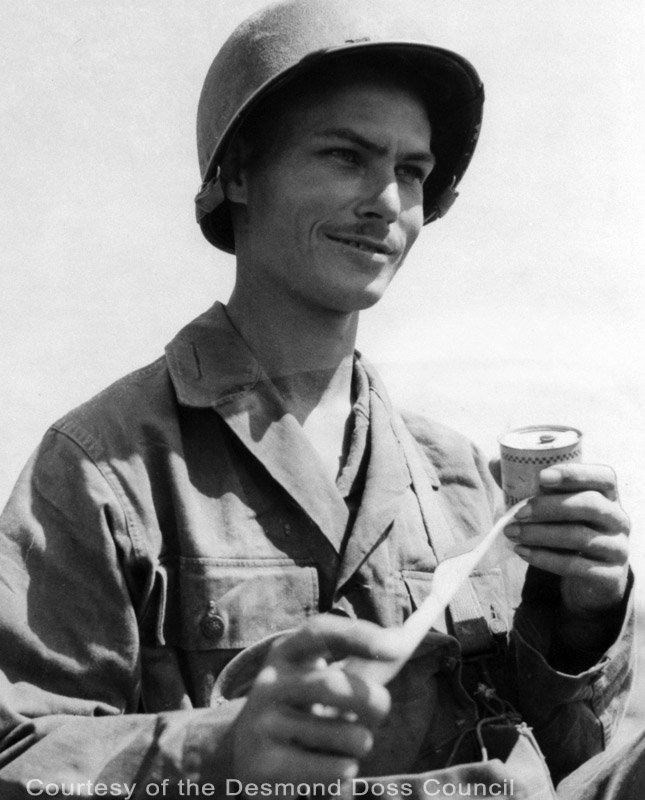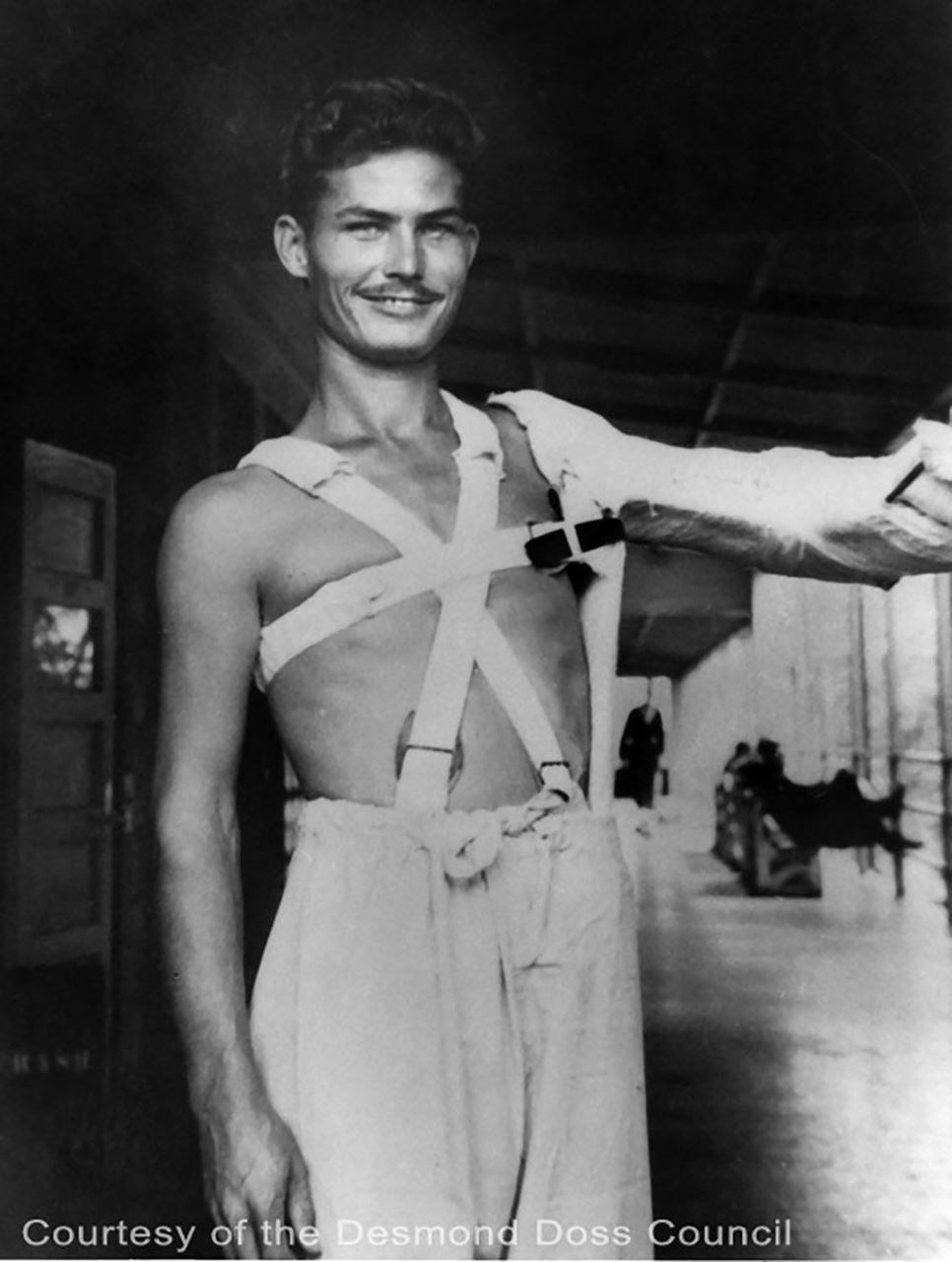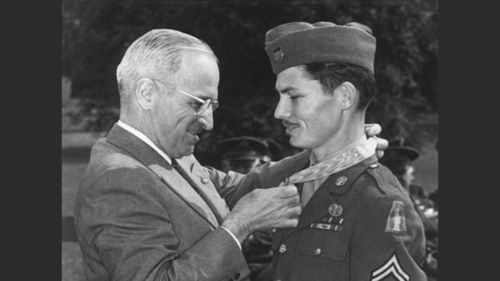Dear God, let me get one more man.
The Soldier Who Never Killed
As Dr. King once said, “The ultimate measure of a man is not where he stands in moments of comfort and convenience, but where he stands at times of challenge and controversy.” In times of discomfort, this quote exemplifies one hero who changed the lives of many men. During WWII, the Allied Forces pressed into Okinawa, Japan, a major territory site that decided the fate of the war. The fight, known as the Battle of Okinawa, was one of the most gruesome clashes. Hundreds of thousands of soldiers died fighting and the Allied Forces were mainly successful from a medic named Desmond Doss. Doss was born February 7, 1919, and grew up as a Seventh Day Adventist in Lynchburg, Virginia, meaning he believed working on Saturdays was against his faith. Though no one bothered him about this as a child, when he joined the military his fellow mates would brutally torment him. They believed Doss was a coward and worthless since his faith forbids him to touch a weapon. However, his determination to help in the war without a weapon shortly came when he was entitled as a medic. After months of training, his infantry transferred to a location in Okinawa commonly known as Hacksaw Ridge. There, men suffered from shards of bullets and metal, and were only comforted by one medic, Doss. He grabbed soldiers one by one under fire and safely took care of each person. His heroic actions gave many men a safe return back to their families, demonstrating how Doss played a key role in the war. Through the trial by fire, Desmond Doss’ exceptional and outstanding actions portrayed the greatest possible characteristics of bravery and selflessness as a medic during WWII.
Fi Doss bandaging comrades. April 28, 1945https://www.arkansasonline.com/rst and foremost, Doss’ repetitive shows of bravery in the war gave major insight to the marvelous hero he was. During his time in Okinawa, he faced several encounters with Japanese soldiers as he hurried to bandage his fellow comrades and carry them back to safety: “On May 2, facing heavy machine-gun fire, he [Doss] ventured out 200 yards in front of American lines to drag a GI to safety. On May 4, he made separate trips under fire to treat and save four wounded men within 25 feet of a heavily defended Japanese cave” (Leepson). Here, Doss was bold enough to stand in front of enemy fire and save a companion. In Doss’ mind, to live a daring and extraordinary life, he had to climb the ropes of death and enter the hornet's nest where probable death neared. For such an act done multiple times, it would take an overwhelming amount of courage, and Doss had it. In addition, his bravery was also revealed when he was the only active soldier on the battlefield that didn’t falter: "Less than one-third of the men made it back down. The rest lay wounded, scattered across enemy soil—abandoned and left for dead, if they weren't already. One lone soldier [Doss] disobeyed orders and charged back into the fire fight to rescue as many of his men as he could, before he either collapsed or died trying. His iron determination and unflagging courage resulted in at least 75 lives saved that day, May 5, 1945, his Sabbath" (Lemay). Even when Doss was alone and on the verge of death, he was able to denote valor for others. He constantly sought discomfort and lived to die for another as his willpower expressed something greater than an average human. For one to acquire such absolute power and bravery, they must go through suffering, which Doss did, and the results were astonishing. His bravery lives in the souls that he salvaged from the deepest abyss of death and it portrays the true hero within him.
Doss bandaging comrades. April 28, 1945https://www.arkansasonline.com/rst and foremost, Doss’ repetitive shows of bravery in the war gave major insight to the marvelous hero he was. During his time in Okinawa, he faced several encounters with Japanese soldiers as he hurried to bandage his fellow comrades and carry them back to safety: “On May 2, facing heavy machine-gun fire, he [Doss] ventured out 200 yards in front of American lines to drag a GI to safety. On May 4, he made separate trips under fire to treat and save four wounded men within 25 feet of a heavily defended Japanese cave” (Leepson). Here, Doss was bold enough to stand in front of enemy fire and save a companion. In Doss’ mind, to live a daring and extraordinary life, he had to climb the ropes of death and enter the hornet's nest where probable death neared. For such an act done multiple times, it would take an overwhelming amount of courage, and Doss had it. In addition, his bravery was also revealed when he was the only active soldier on the battlefield that didn’t falter: "Less than one-third of the men made it back down. The rest lay wounded, scattered across enemy soil—abandoned and left for dead, if they weren't already. One lone soldier [Doss] disobeyed orders and charged back into the fire fight to rescue as many of his men as he could, before he either collapsed or died trying. His iron determination and unflagging courage resulted in at least 75 lives saved that day, May 5, 1945, his Sabbath" (Lemay). Even when Doss was alone and on the verge of death, he was able to denote valor for others. He constantly sought discomfort and lived to die for another as his willpower expressed something greater than an average human. For one to acquire such absolute power and bravery, they must go through suffering, which Doss did, and the results were astonishing. His bravery lives in the souls that he salvaged from the deepest abyss of death and it portrays the true hero within him.
 Doss' shattered arm after getting shot by a Japanese sniper.https://www.arkansasonline.com/Furthermore, when it came to selflessness, Doss would more than likely give his life away for another under any circumstances. As he carried his teammates across the battlefield, never did he account about himself, but only the pain the wounded soldiers had to endure: "While others were taking life, he [Doss] was busy saving life. When the cry, ‘medic’ rang out on the battlefield, he never considered his own safety. He repeatedly ran into the heat of battle to treat a fallen comrade and carry him back to safety. All this, while enemy bullets whizzed past and mortar shells exploded around him" (Lemay). Unlike most soldiers in WWII, Doss wasn’t afraid of endlessly staying on the battlefield. His faith in selflessness indicated his value and concerns for others. In times of pain and despair, he knew that if he turned to care for himself, his selfishness would take the main image of altruism away from him. Additionally, Doss single-handedly with wounds fought to grasp his comrades for hours. He never stopped to rest and believed that getting one more person after another was the moral thing to do, even if his life was on the line: "After each successful delivery [saved soldiers], he reportedly said, ‘Dear God, let me get just one more man.’ By nightfall, he had rescued 75 soldiers, including many of the men who had berated him earlier in his military career… Doss was seriously wounded in the leg by a grenade. Instead of calling on another medic for help, he treated himself and waited five hours to be rescued… Doss insisted that another badly injured soldier take his spot on the stretcher. As he continued his trek on foot, Doss was hit by a sniper, shattering his arm" (Lange). This demonstrated a character who had achieved a level of selflessness where he didn’t even think about himself for a second when he underwent agony and stress. When Doss exclaimed “Dear God, let me just get one more man”, it further testifies why he looked to help others. He never did it because of fame, glory, or power but by his faith in his religion, he did it to credit his God. Even after a grenade and sniper hit Doss, his heart grew toward the Golden Rule and he lent his chance to live to another human being for their sake. Despite some people he saved were the ones who persecuted and bullied him during training, Doss didn’t care about their past interactions and only wanted them to survive. He never held a grudge or hated any of his peers, once again displaying selflessness and a pure heart full of care. One man after another, his willpower to help others didn’t waver and his persistence showed the unbearable pain he endured from the constant stress and attacks.
Doss' shattered arm after getting shot by a Japanese sniper.https://www.arkansasonline.com/Furthermore, when it came to selflessness, Doss would more than likely give his life away for another under any circumstances. As he carried his teammates across the battlefield, never did he account about himself, but only the pain the wounded soldiers had to endure: "While others were taking life, he [Doss] was busy saving life. When the cry, ‘medic’ rang out on the battlefield, he never considered his own safety. He repeatedly ran into the heat of battle to treat a fallen comrade and carry him back to safety. All this, while enemy bullets whizzed past and mortar shells exploded around him" (Lemay). Unlike most soldiers in WWII, Doss wasn’t afraid of endlessly staying on the battlefield. His faith in selflessness indicated his value and concerns for others. In times of pain and despair, he knew that if he turned to care for himself, his selfishness would take the main image of altruism away from him. Additionally, Doss single-handedly with wounds fought to grasp his comrades for hours. He never stopped to rest and believed that getting one more person after another was the moral thing to do, even if his life was on the line: "After each successful delivery [saved soldiers], he reportedly said, ‘Dear God, let me get just one more man.’ By nightfall, he had rescued 75 soldiers, including many of the men who had berated him earlier in his military career… Doss was seriously wounded in the leg by a grenade. Instead of calling on another medic for help, he treated himself and waited five hours to be rescued… Doss insisted that another badly injured soldier take his spot on the stretcher. As he continued his trek on foot, Doss was hit by a sniper, shattering his arm" (Lange). This demonstrated a character who had achieved a level of selflessness where he didn’t even think about himself for a second when he underwent agony and stress. When Doss exclaimed “Dear God, let me just get one more man”, it further testifies why he looked to help others. He never did it because of fame, glory, or power but by his faith in his religion, he did it to credit his God. Even after a grenade and sniper hit Doss, his heart grew toward the Golden Rule and he lent his chance to live to another human being for their sake. Despite some people he saved were the ones who persecuted and bullied him during training, Doss didn’t care about their past interactions and only wanted them to survive. He never held a grudge or hated any of his peers, once again displaying selflessness and a pure heart full of care. One man after another, his willpower to help others didn’t waver and his persistence showed the unbearable pain he endured from the constant stress and attacks.
 Doss awarded the Medal of Honor. October 12, 1945https://www.adventist.org/en/Ultimately, the bravery and selflessness built by Desmond Doss soon modeled him into a prodigious hero. Through the continuous acts of bravery in WWII, where he charged alone to one of everyone's greatest fears, death, he did not shudder. Even when wounded himself, his desire to relieve the pain did not come until everyone else was treated and satisfied, creating a powerful hero with an abundance of selflessness. As Doss once said, “‘From a human standpoint, I shouldn't be here to tell the story,’ Mr. Doss told The Richmond Times-Dispatch in 1998. ‘All the glory should go to God. No telling how many times the Lord has spared my life’” (Goldstein). Again, Doss is selfless and doesn’t credit any of his actions, but gives it to his God. Even when society saw and praised him as a savior, he still didn’t believe that he was worthy of any honor as he states “All the glory should go to God”. It influences others to not take pride in all the good deeds they do, since it more than likely involved others to perform that heroic act. He had all the power and authority to accept the praise and glory, but to be a future example and model for others, he didn’t. For our posterity, his influence carries on to people that believe they’re incapable of challenges and changes their understanding of life in furtherance to become brave and selfless.
Doss awarded the Medal of Honor. October 12, 1945https://www.adventist.org/en/Ultimately, the bravery and selflessness built by Desmond Doss soon modeled him into a prodigious hero. Through the continuous acts of bravery in WWII, where he charged alone to one of everyone's greatest fears, death, he did not shudder. Even when wounded himself, his desire to relieve the pain did not come until everyone else was treated and satisfied, creating a powerful hero with an abundance of selflessness. As Doss once said, “‘From a human standpoint, I shouldn't be here to tell the story,’ Mr. Doss told The Richmond Times-Dispatch in 1998. ‘All the glory should go to God. No telling how many times the Lord has spared my life’” (Goldstein). Again, Doss is selfless and doesn’t credit any of his actions, but gives it to his God. Even when society saw and praised him as a savior, he still didn’t believe that he was worthy of any honor as he states “All the glory should go to God”. It influences others to not take pride in all the good deeds they do, since it more than likely involved others to perform that heroic act. He had all the power and authority to accept the praise and glory, but to be a future example and model for others, he didn’t. For our posterity, his influence carries on to people that believe they’re incapable of challenges and changes their understanding of life in furtherance to become brave and selfless.
Works Cited
Goldstein, Richard. "Desmond T. Doss, 87, Heroic War Objector." New York Times, 25 Mar. 2006, p. A13(L). Biography In Context, https://link.galegroup.com/apps/doc/A143672616/BIC?u=powa9245&sid=BIC&xid=eedbb9d9. Accessed 7 Dec. 2018
Lange, Katie. "PFC. DESMOND DOSS: THE UNLIKELY HERO BEHIND 'HACKSAW RIDGE'." States News Service, 28 Feb. 2017. Biography In Context, https://link.galegroup.com/apps/doc/A484395112/BIC?u=powa9245&sid=BIC&xid=6f16ec87. Accessed 10 Dec. 2018.
Leepson, Marc. "Wonder man of Okinawa." Military History, Sept.-Oct. 2008, p. 21. Biography In Context, https://link.galegroup.com/apps/doc/A213310253/BIC?u=powa9245&sid=BIC&xid=16ddf1cd. Accessed 7 Dec. 2018
Lemay, Jon. “The Conscientious Objector.” Desmond Doss: The Real Story, Georgia-Cumberland Conference of Seventh-Day Adventists, 2000, https://desmonddoss.com/index.php.
Page created on 1/8/2019 10:14:41 PM
Last edited 1/14/2019 11:18:10 PM
